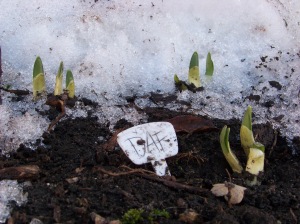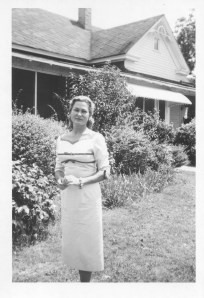Much as I dislike the of-necessity neologism “staycation,” that’s what I’m doing while my college is on spring break this week – enjoying the days that immediately fill with things to do even if classes aren’t in session (hence my students’ question, “do you even get a break?” Weeellll….)
But staying at home doesn’t mean new things aren’t happening.

I do have some grading that needs to happen before the end of the week (more than “some,” actually). But I also got to spend Saturday clearing out the thickets of rotting leaves and stems from around the new little green shoots of lilies and poppies and strawberries and rhubarb coming up all around the yard. Broke ground on an expansion of the lilac bed along the back fence. A lovely rain Saturday night and yesterday morning melted the last of the snow lingering in the perennial beds and helped incorporate all the new materials in my compost pile even more.
Scuffing away chunks of snow, I discovered the lilies and the daffodil bulbs I planted last fall — a gift from my friend Jill Stephenson in Allamakee County — had come up even though the little green tips pressed right into the ice, which had the crumbly open texture of a county-fair snow-cone. Mice had tunneled between the dirt and the snow, to and from the bird feeders, and now the long snaky paths lay exposed to the light. I washed out and refilled my birdbath and a robin came to it almost instantly, dunking his whole body headfirst and sluicing water back over his wings, over and over.
When the rain came the next day I burrowed in at my desk to work on a writing project that is getting bigger and more multitentacled by the day, but also more fascinating: a creative-nonfiction piece on three women of the same generation, all named Elizabeth, all born around 1920, who grew up in the South and left it. Two were/are writers — Elizabeth Hardwick and Elizabeth Spencer. The third was my great-aunt, Elizabeth Weldon Williams, famous in our family for her beauty, her strong will, and her elopement at age 17 with a traveling salesman, embarking on a life of divorce, remarriage, and further travel that eventually led to California. In my mind these three lives draw together on some hidden gravitational track, making me ask all kinds of questions: How do women create, or recreate, themselves, and why? What are the hidden connections between lives that seem completely unrelated? What are the perennial problems to solve for women in this or any generation – work, love, family, art, the boundaries of the self? Where, and why, do we travel away from home? And alongside that, of course: how do we earn our living, secure our present and future needs, get honest with ourselves and other people?
It is really interesting to me that the most vivid piece of information I have about my great-aunt is her elopement, that famous and then-completely-unprecedented-in-my-family rebellion against strict parents (although her father died when she was 21, her mother remained her lifelong touchstone and, I suspect, beloved adversary) and four older brothers. My mother and I were both amazed to realize — although my mother knew “Sister” (as she was known, in typical Southern fashion) as an adult, and she died six years ago — that neither of us were exactly sure what she did for a living. Research can be every bit as much a part of creative work as it can of scholarship, I tell my students. And there’s quite a bit of research to do here.
 Including research into my own life. Another project I’d planned for this break is beginning the program outlined in Your Money or Your Life — which starts with adding up, to the best of your ability, all the money you have ever made, in order to get a sense of your real potential for bringing money into your life. Talk about research. But just like research for this creative project, it’s personal and exciting — and dangerous because it is so personal. Think of all the memories associated with our early jobs, all we learned or didn’t learn about money and its relationship to life. The two months cleaning cabins at a guest ranch in Colorado, where I worshipped from afar a handsome Princeton senior (visiting with his parents and his little brother) who preferred the other “cabin girls” (shorter, cuter, and of legal drinking age.) Washing dishes in a restaurant kitchen in my hometown. Pocketing twenty dollars here and there for teaching riding lessons. And that’s not even up to age 21.
Including research into my own life. Another project I’d planned for this break is beginning the program outlined in Your Money or Your Life — which starts with adding up, to the best of your ability, all the money you have ever made, in order to get a sense of your real potential for bringing money into your life. Talk about research. But just like research for this creative project, it’s personal and exciting — and dangerous because it is so personal. Think of all the memories associated with our early jobs, all we learned or didn’t learn about money and its relationship to life. The two months cleaning cabins at a guest ranch in Colorado, where I worshipped from afar a handsome Princeton senior (visiting with his parents and his little brother) who preferred the other “cabin girls” (shorter, cuter, and of legal drinking age.) Washing dishes in a restaurant kitchen in my hometown. Pocketing twenty dollars here and there for teaching riding lessons. And that’s not even up to age 21.
The good thing and the dangerous thing about a chunk of free time is that it takes away excuses for not working on “your own stuff” pretty quickly. It’s a bit scary, depending on what you find. But what you find can also be a discovery — or set the foundation for a series of discoveries — that continues to connect you with your past even as it makes you free.
After all, our ancestors had their gardens too.

2 thoughts on “Spring break: discoveries.”
Comments are closed.